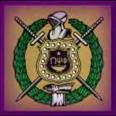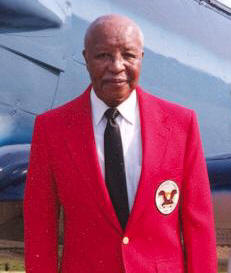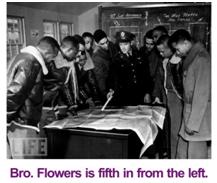 |
|

Brother Charles Flowers, Tau Psi Spring '46
The Gazette.net, February 22,2007
by Mary Prabhu
Charles Herbert Flowers remembers how excited he was to begin his training as a pilot in the Army Air Corps in Tuskegee, Ala. He grasped at the opportunity to enroll in September 1941 after being told that for the first time, the Air Corps was accepting blacks into its cadet program.
 Two days after he completed his training in May 1942, Flowers was asked to stay on at Tuskegee to be a flight instructor. He would provide primary-level flight training to cadets joining the program.
Two days after he completed his training in May 1942, Flowers was asked to stay on at Tuskegee to be a flight instructor. He would provide primary-level flight training to cadets joining the program.
Flowers became known as a Tuskegee Airman.
He was among scores of African Americans who broke the flight barrier to become America’s first black military airmen, according to the Tuskegee Airmen Inc. Web site.
‘‘Those who possessed the physical and mental qualifications were accepted as aviation cadets to be trained initially as single-engine pilots and later to be either twin-engine pilots, navigators or bombardiers,” the Web site states.
Flowers, 88, who lives in Glenarden, has racked up several firsts since his aviation days, and in honor of his achievements, Prince George’s County named one of its schools undefined the Charles H. Flowers High School in Springdale undefined in his honor in 2000.
Flowers was the first student government president at North Carolina Central University; he was among the first round of cadets that graduated from Tuskegee; and he became the first African-American, military-trained flight instructor for the Tuskegee Airmen.
‘‘I still feel like I’m going to wake up and find out it was all a big dream,” Flowers said of having a school named after him.
Boyd Poole, a member of Ebenezer United Methodist Church in Lanham, which Flowers attends, said he played a role in the school-naming process. Poole said that around 1997, he learned that Flowers was a Tuskegee Airman only after he saw a display about him at the church.
‘‘The man doesn’t talk about himself. What a gentleman he is,” Poole said.
Poole, a special assistant to state Sen. Nathaniel Exum (D-Dist. 24) of Capitol Heights, said he showed some of the exhibits to Exum, who was a state delegate at the time. Exum then got the General Assembly to recognize Flowers as the state’s black history representative during Black History Month that year, Poole said.
‘‘After he had that honor ... the senator was saying, ‘What else can we think of doing for this man because he’s such an historical icon,’” Poole said. The men’s group at the church, which includes members of Exum’s campaign committee, decided they wanted to have the school that was being built in Springdale named for Flowers, Poole said.
The group researched the process of naming a school, and, along with Exum, recommended Flowers’ name to the school board in 1997. The school board granted their request in 2000, Poole said.
Poole’s wife, Dorothy, is writing Flowers’ biography, which she hopes to finish in a year.
‘‘He’s a very fine man. He’s very humble and he has all this history and importance to him,” she said. ‘‘I’m interviewing him and getting his history and putting all of it down so that young people can read about him.”
Flowers grew up in the countryside in Wadesboro, N.C.
‘‘There wasn’t much to do. We had no modern conveniences undefined no electricity, no running water,” he said. ‘‘So we always looked forward to going to school and church.”
He left Wadesboro at age 16 to attend the Negro Agricultural & Technical College of North Carolina in Greensboro, N.C. undefined now known as North Carolina A&T State University undefined on a two-year scholarship, where he studied to become a medical doctor. But the scholarship funds ran out, forcing Flowers to leave school and to look for a job to pay the fees.
Flowers said while working for a clothing manufacturer in Baltimore, he learned that the Army Air Corps had begun to allow young, black men to train to become pilots, so he applied. He said he had always been interested in learning how to fly, but he never had the money to take the lessons.
‘‘It was something that looked exciting. It satisfied my draft requirement ... and provided me with the means to go back to college,” Flowers said.
He came out at the top of the class, and worked for three years as a flight instructor. Flowers then returned to college in 1945, attending the North Carolina College for Negroes, known today as North Carolina Central University. He said he changed his major to business administration because by then, he had started a family, and medical school would have been too demanding on his time. He married Wilhelmina Flowers in 1943, and their first child, Carolyn, was born in 1944.
‘‘We got married in 1943 and August 4 will make 64 years,” he said. ‘‘I had a family and I didn’t want to sacrifice that to go to [medical] school.”
At North Carolina Central, Flowers said he and his classmates wanted to make a mark. They talked about what they could do in their senior year to leave a legacy at the school. Flowers suggested establishing a student government association.
‘‘So the student government was established at my suggestion,” he said. Flowers was elected the first president after defeating his opponent, Harold Epps.
‘‘Harold Epps ran a strong campaign, but he ran as an Alpha [a member of Alpha Phi Alpha Fraternity, Inc.] and I ran as an Omega [a member of Omega Psi Phi Fraternity, Inc.], and the Omegas were stronger on the campus,” he recalled.
Flowers came to Maryland in 1965 to work at NASA Goddard Space Flight Center in Greenbelt. He started as an electronic technician and worked his way up the ranks, retiring as a manager of employee relations in 1990.
After he retired, Flowers started to mentor at-risk elementary and middle school pupils through his church, Ebenezer United Methodist in Lanham. Pupils come from James McHenry and Thomas Johnson middle school, both in Lanham.
He has also worked with the Youths in Aviation program sponsored by the Tuskegee Airmen. The program exposes high school students to a range of aviation fields and meets in the spring and summer at the College Park Airport.
Reflecting upon his flight-instructing days in the 1940s, Flowers recalled that he never saw combat.
‘‘I feel like I contributed more by instructing. I personally instructed over 100 pilots that went to war,” he said. ‘‘And I didn’t get shot at.”
Source: TheGazette.net

 Email: Krs@xggomegas.com
Email: Krs@xggomegas.com